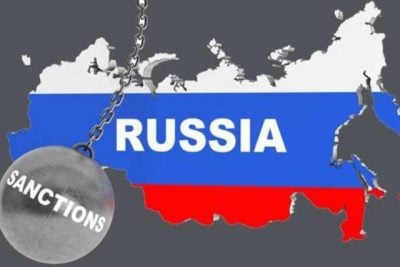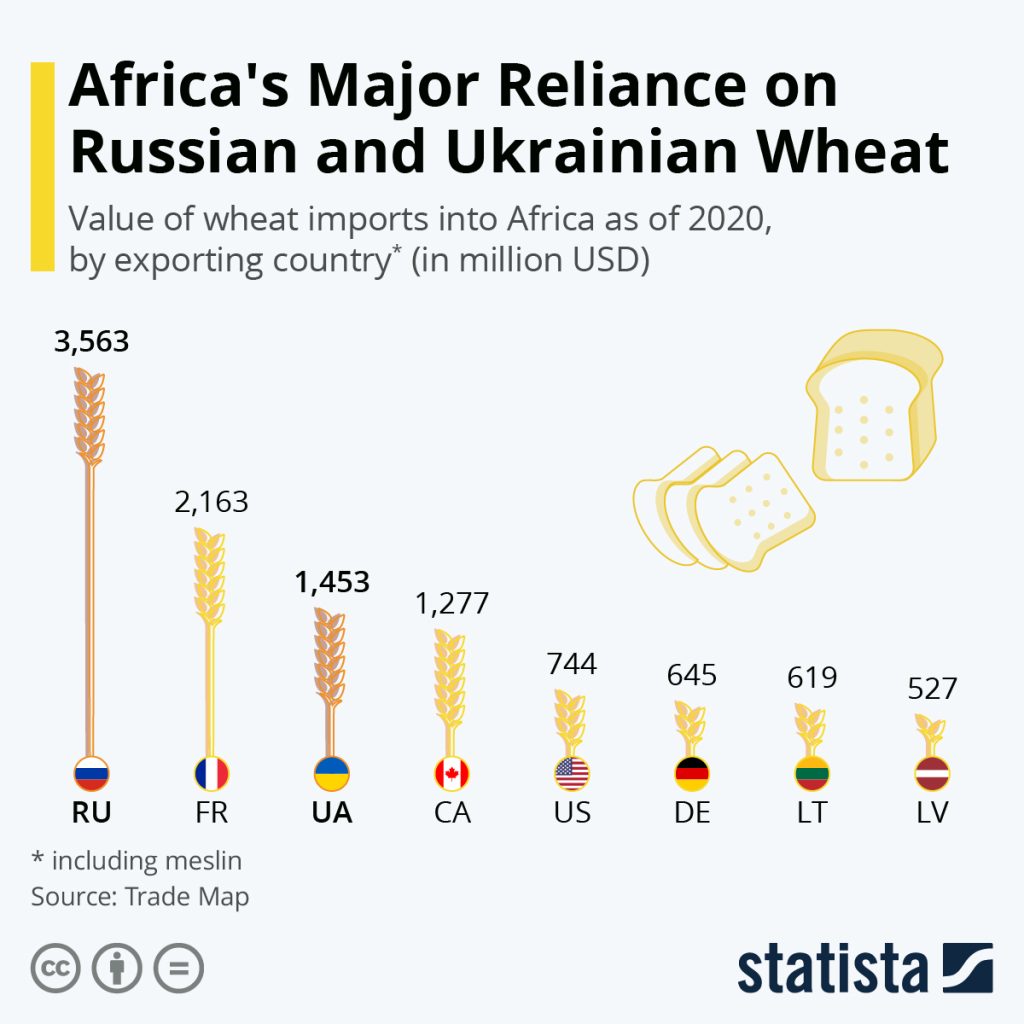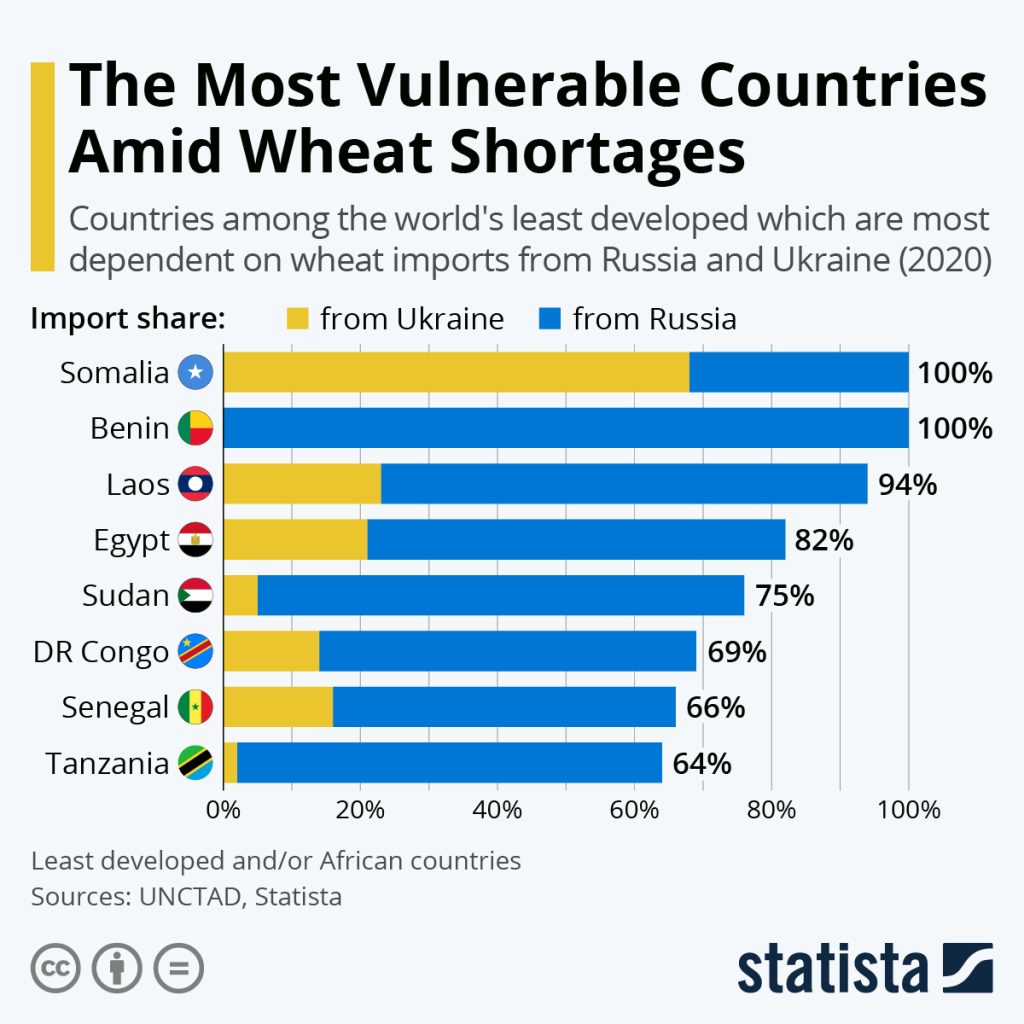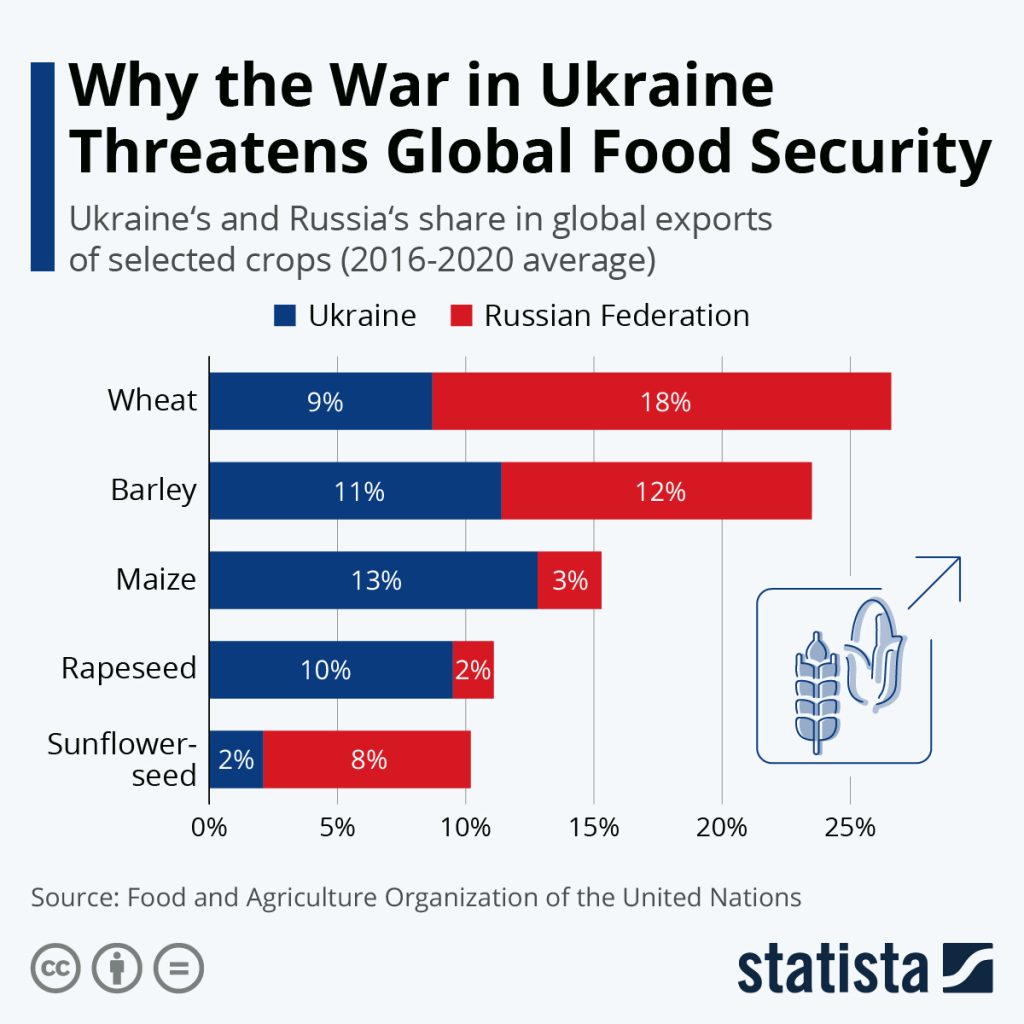Western Sanctions Against Russia Create Food Deficits Globally

Leading up to and after the Russian special military operation in Ukraine beginning on February 24, the United States and its allies within the North Atlantic Treaty Organization (NATO) and the European Union (EU) have imposed unprecedented sanctions against the Russian Federation.
Relations between Washington and Moscow have been strained for many years since the Russian Federation emerged from a period of serious decline in the wake of the collapse of the Union of Soviet Socialist Republics (USSR) in 1991.
From the period of the Bolshevik Revolution of October 1917 to the advent of the U.S. intervention in the European Theater of Operations during World War II, the character of relations between the capitalist states, including the U.S., and the Soviet Union were viewed as a struggle between two differing and opposing social systems. Even in the post-Soviet era of the last decade-and-a-half, there are conflicting interests that have driven both world powers to the current conflict in Ukraine.
The rise of the Cold War in the late 1940s, aggravated the tensions which were somewhat submerged in the years of 1941-1945. Nazi Germany invaded the Soviet Union in June 1941 and later that same year declared war on the U.S. as a response to the December 7 Japanese military attacks on Pearl Harbor in occupied-Hawaii.
On an international geostrategic level, the Soviet Union and the U.S. found themselves on the opposite sides of the political spectrum. In Africa, Asia and Latin America, the Soviet Union supported the national liberation movements and those independent governments seeking to build an anti-imperialist and socialist orientation. While the Pentagon supplied weapons to the colonial-fascist forces in Portugal, Rhodesia and apartheid South Africa to suppress the mass-guerrilla revolutionary organizations, the Soviet Union and other socialist states such as China, Cuba, North Vietnam and North Korea, provided political and material assistance to the movements seeking to overturn the legacy of colonialism.
In today’s global situation absent the Soviet Union and its allied states in Eastern Europe, the U.S. is attempting to expand the presence of NATO. This is taking place in Europe as well as other geopolitical regions. Throughout Africa, the U.S. Africa Command (AFRICOM) and Operation Barkhane coordinated by France, has initiated military campaigns under the guise of fighting jihadist terrorism. Nonetheless, in several West African states, governments are turning to President Vladimir Putin and the Russian military apparatus to approach the security crisis from another perspective. (See this)
As it relates to the sanctions imposed by Washington, Wall Street and their allies in Europe, the impact is being felt internationally. In the U.S. the prices of fuel, food, transportation, housing and utilities are rising rapidly. These price increases are in part due to the mismanagement of the economy stemming from the COVID-19 pandemic. However, the instigation of a war between Russia and Ukraine has worsened the economic situation of workers and oppressed peoples in the U.S. and around the world.
With specific reference to the African continent, countries such as Somalia, Benin, Egypt, Sudan, the Democratic Republic of Congo (DRC), Senegal and Tanzania are being adversely affected by the market disruptions caused by sanctions and the war in Ukraine. In fact, the level of Russian and Ukrainian wheat imports to Africa far exceeds those of the U.S. by nearly 500%. (See this)
Africa imports more than five times wheat from Russia than US (Source: Statista)
Consequently, the sanctions against Russia and the constant shipping of weapons to the pro-NATO regime in Kiev is serving as a mechanism to intensify the economic war aimed at the destabilization Moscow. Yet this renewed Cold War policy is effectively creating the conditions for the starvation of hundreds of millions of Africans and others throughout the globe.
Statistics Reveal Worsening Problems in Agricultural Sectors
According to a report published by Al Jazeera on the burgeoning food supply crisis:
“The UN Food and Agriculture Organization (FAO) said its Food Price Index, which tracks monthly changes in international prices for a basket of commodities, averaged 159.3 points last month, up 12.6 percent from February. As it is, the February index was the highest level since its inception in 1990. FAO said the war in Ukraine was largely responsible for the 17.1 percent rise in the price of grains, including wheat and others like oats, barley and corn. Together, Russia and Ukraine account for approximately 30 percent and 20 percent of global wheat and corn exports, respectively.”
Although the Western corporate media outlets make it appear as if the new sanctions being imposed on Russia almost on a daily basis have no effect on people living in the U.S. and the NATO countries, this could not be further from the truth. Even in the U.S., working people, youth, seniors, people living with disabilities and marginalized oppressed communities are suffering immensely from the rise in prices for essential commodities and services. As far as the administration of President Joe Biden is concerned, there has been no systematic policy initiatives to address the rapidly rising inflation. A plan to release oil supplies from the strategic petroleum reserve in the U.S. has not had any significant impact on easing the financial stress facing consumers. (See this)
NATO war impacts on African states (Source: Statista)
In addition, European countries are facing a monumental energy crisis with the restrictions being placed on the importation of Russian produced oil and natural gas. Food products are scarce and expensive while real income due to the rise in inflation is in significant decline.
Ukraine conflict threatens global food security (Source: Statista)
There is a direct link between the costs associated with energy, transportation and food supplies. In underdeveloped regions of the world the problems stemming from the Ukraine war and the sanctions imposed by imperialist states take on acute proportions. The rise in prices for imports of refined energy resources and food will only drain national treasuries and household incomes of the workers and farmers.
One tracking news agency Axios emphasizes:
“In poorer countries where folks spend upward of 50% or more of their income on food, these numbers are devastating…. The tools that central banks are using to fight inflation — rate hikes, quantitative tightening — are meant to curtail demand, but can do little to address global supply problems. ‘Raising rates will not resolve the war or address the supply chain,’ said Jean Boivin, head of the BlackRock Investment Institute. The index tracks a basket of commodities including cereals, vegetable oils, dairy, meat and sugar. The prices of wheat and sunflower oil, in particular, are rising because of the war. Some Ukrainian ports are closed and others face disruptions. Issues will certainly drag into next year as some farmers in Ukraine — the leading sunflower-oil exporter and a top grains supplier — are unable to plant crops. The U.S. is also struggling with rising food prices. Expect to hear more about that Tuesday morning, when the March Consumer Price Index is released.”
The War Could Have Been Avoided
Media reports in the corporate and capitalist-government controlled agencies suggest that the intervention by Russia into Ukraine was unprovoked. Yet the Russian government for years has warned about the military actions of NATO in Eastern Europe. Successive administrations both Democratic and Republican have identified Russia along with China as principal enemies of the U.S. and its people.
U.S. Secretary of State Antony Blinken in his travels to Europe only serves to further extend the war in Ukraine. The United Nations as an ostensible multilateral institution has failed miserably reflecting the destructive role that the White House plays in undermining its effectiveness in preventing international conflicts that have the potential to result in the use of nuclear weapons.
The economic insecurities experienced by millions within the U.S. are a direct result of the failed policies of the capitalist system. Working people and the oppressed are forced into ever declining standards of living while corporate profits soar alongside the growing military-industrial-complex which annually expropriates larger amounts of the surplus value generated by labor.
Anti-imperialist and antiwar forces in the U.S. and the NATO countries must reject the militarist policies that only benefit defense manufacturers and Wall Street. The wealth siphoned off through endless wars of aggression and international conquest could be utilized to rebuild a world system based upon mutual interests and sustainable security.
*
Note to readers: Please click the share buttons above or below. Follow us on Instagram, Twitter and Facebook. Feel free to repost and share widely Global Research articles.
Abayomi Azikiwe is the editor of the Pan-African News Wire. He is a regular contributor to Global Research.





